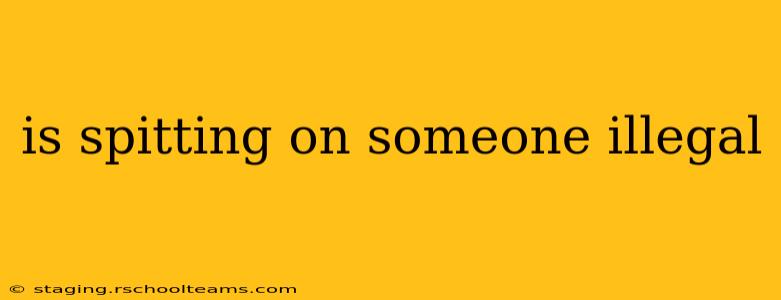Is Spitting on Someone Illegal? A Comprehensive Look at Assault and Battery Laws
Spitting on someone is generally considered illegal, and the legality hinges on the specific circumstances and the relevant laws of the jurisdiction. While it might seem like a minor act, spitting can constitute assault and battery, both of which are criminal offenses. This post will explore the legal ramifications of spitting on someone, addressing common questions and clarifying the nuanced aspects of this offense.
What constitutes assault and battery?
Assault and battery are closely related but distinct offenses. Assault typically involves the apprehension of imminent harmful or offensive contact. This means the victim reasonably believes they are about to be harmed. Battery, on the other hand, is the actual, unlawful, harmful, or offensive physical contact. Spitting on someone is generally considered battery because it involves the unwelcome physical contact of saliva.
The key element here is unwelcome. If the spitting is consensual, for instance, during a playful activity, it’s unlikely to be considered a crime. However, any non-consensual spitting is a strong indicator of unlawful conduct.
Is spitting considered assault and battery?
Yes, spitting on someone typically qualifies as battery. The act is offensive and constitutes unwanted physical contact. Depending on the context, it could also constitute assault if the victim reasonably feared immediate harm before the spitting occurred. For example, if the spitter threatened violence before spitting, the action could be charged as both assault and battery.
The severity of the charges can vary, influenced by factors such as:
- The intent of the spitter: Was it a random act, a targeted attack driven by hatred (hate crime), or something else?
- The injuries sustained: Did the victim suffer any physical harm, such as disease transmission or psychological trauma?
- The relationship between the spitter and the victim: Is it a stranger, an acquaintance, a family member?
- The location of the incident: Did it happen in public, a private setting, or a place where certain laws are stricter (e.g., a courthouse)?
What are the penalties for spitting on someone?
Penalties vary greatly depending on the jurisdiction and the specific circumstances of the case. They can range from fines to jail time, and potentially civil lawsuits for damages. In some cases, especially if the spitting involves hate speech or results in serious injury, the penalties can be quite severe. The charges could involve misdemeanors or felonies, significantly impacting sentencing.
Can spitting be considered a hate crime?
Yes, spitting can be considered a hate crime if it's motivated by prejudice based on race, religion, ethnicity, sexual orientation, gender, disability, or other protected characteristics. In such cases, the penalties are usually significantly more severe than for a simple battery charge.
What should I do if someone spits on me?
If someone spits on you, immediately:
- Ensure your safety: Prioritize your well-being and remove yourself from the situation if possible.
- Seek medical attention if needed: If you have any concerns about disease transmission or other injuries, seek medical help.
- Report the incident to the authorities: Contact the police and file a report. Provide as much detail as possible, including the time, location, and description of the perpetrator.
- Gather evidence: If possible, obtain any witnesses' contact information. Seek medical attention to document any injuries.
In conclusion, spitting on someone is illegal in most jurisdictions and can lead to various legal repercussions, from fines to jail time, depending on the specifics of the situation. It's crucial to understand that this seemingly minor act can have significant legal and personal consequences for both the victim and the perpetrator. If you are ever a victim of this offense, ensure your safety and report the incident to the relevant authorities.
